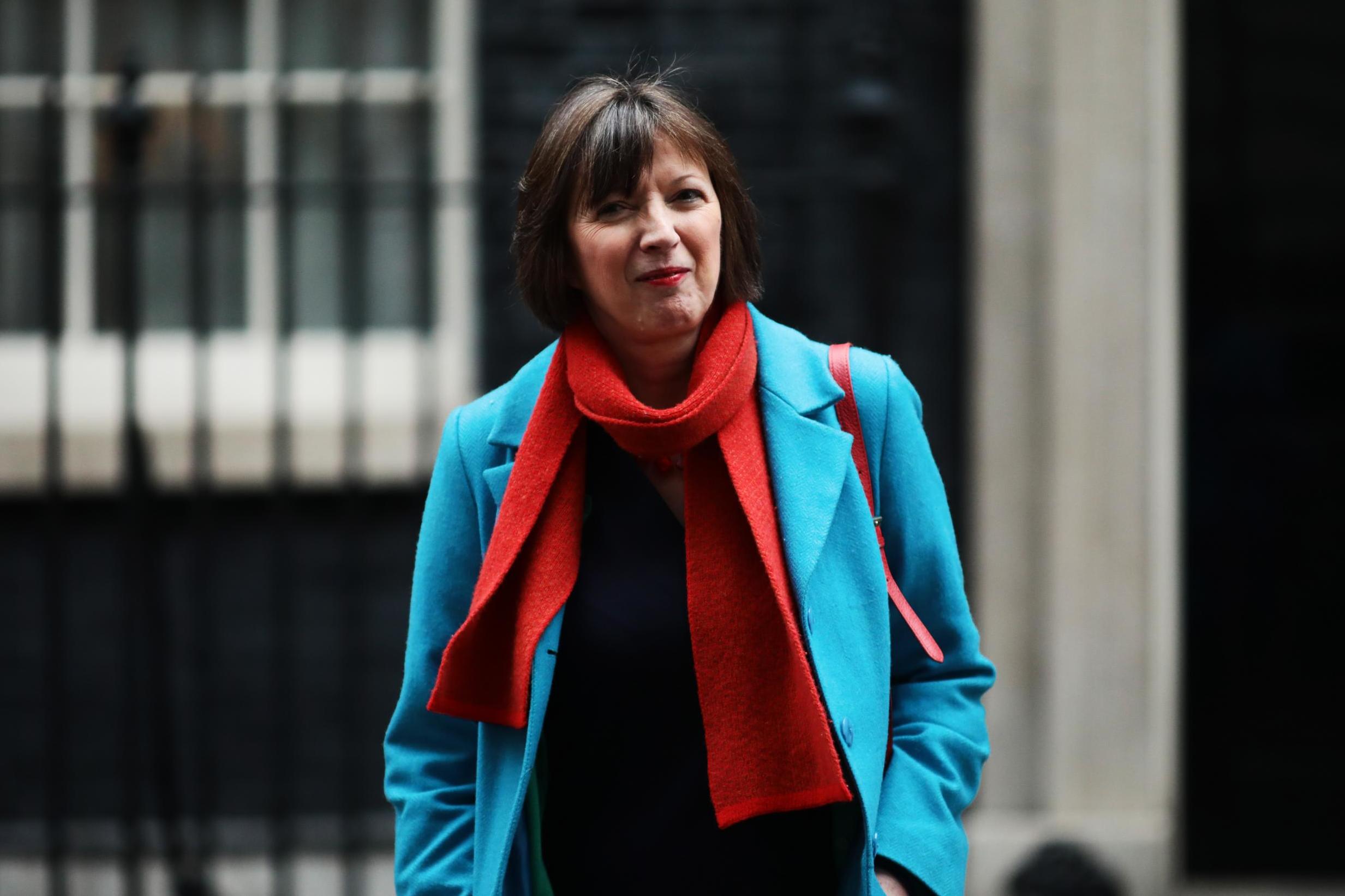In a crisis, the government has a moral duty to launch no-interest loans
The Treasury is sitting on a plan to offer no-interest loans to the low-paid. James Moore looks into the possibility of Britain following Australia’s success and introducing the scheme, but he isn’t holding his breath


The noise from the kitchen is ominous. You swallow hard and take a look. There’s water all over the floor. The noise was the washing machine’s death rattle. With a family requiring clean clothes crashing into a tight budget with almost no slack, what do you do? This could be the script for a payday loan company's commercial. But with coronavirus stalking the streets, Britain's dismal statutory sick pay at less than £100 a week, and many people people in the gig economy unable to qualify for even that limited protection, it's potentially become an even bigger problem.
Britain was suffering from an epidemic of debt before the very real epidemic emerged. Step Change, the debt charity, puts the number of people struggling at around 10 million. The number looks set to grow. Domestic crises like the one above are how people find themselves jumping on to the 1000 per cent plus APR sub-prime credit treadmill that ultimately leaves them facing financial crises they can’t escape.
In stark contrast, prime borrowers with tip-top credit ratings can borrow at as little as 12.6 per cent for a personal loans of £1,000 or so. Bigger loans can be had for as little as 3.3 per cent. Best buy mortgages can be had for as little as 1.4 per cent, although arrangement and valuation fees put up the cost a bit.
Happy days for the haves. A horror story for the have nots. But it doesn’t have to be that way. Australia appears to have found an answer to a problem that isn’t unique to Britain. And in 2018 former Chancellor Philip Hammond announced a feasibility study into how its wildly successful No Interest Loan Scheme might be brought to Britain.
The Independent has learned that the work, carried out by London Economics, a consultancy, is now with the Treasury. Unfortunately, it’s currently sitting at the bottom of an in-tray somewhere, lost in the long grass of Whitehall where all good ideas go to die.
Australia’s No-Interest Loans schemes (Nils) – you read that right – had its genesis in Collingwood, Melbourne, in 1981. Youth workers found a lack of access to ready cash for essential household items was a major impediment to people trying to improve their circumstances. A Catholic religious order established a zero interest loans programme to help men and women purchase essential items.
Good Shepherd Microfinance was established in 2012 to maintain and grow the scheme. It now has the support of more than 160 accredited providers, and is run in partnership with the Australian government’s Department of Social Services and National Australia Bank (NAB). The result is that Australians on low incomes can replace that washing machine without getting ripped off. To the contrary. Qualifying families are those with incomes of less than A$45,000 (£23,500), which can demonstrate that they can pay their loans back. They can borrow up to A$1,500 with the money provided on the basis of “circular community credit”.
Clients are told that when they pay back their loans the capital will be used to fund new loans to those in a similar situation. The idea has helped foster a high reported repayment rate of between 95 and 97 per cent.
Happy days for the haves. A horror story for the have nots. But it doesn’t have to be that way. Australia appears to have found an answer to a problem that isn’t unique to Britain
NAB also funds StepUp loans of between A$800 and A$3,000, at a low interest rate of 5.99 per cent APR. A report into the scheme was published in 2014, with the research conducted by the University of New South Wales and found it was having very positive results. About 82 per cent of the 710 Nils clients spoken to by researchers experienced a net improvement in social and economic outcomes with only 2 per cent in the opposite camp.
A further 74 per cent experienced “an improvement in their social and health outcomes due to positive changes in their standard of living, stress and anxiety levels, confidence in achievements, general confidence and self-esteem, physical health, personal relationships and participation in society”.

The financial capabilities of 47 per cent of people improved: they followed a budget, paid bills on time, saved money, maintained emergency savings and comparison shopped more often. Since its launch, the scheme has reached more than 200,000 people and counting. That’s 200,000 people who will largely have escaped the clutches of predatory lenders.
Elliot Anderson, head of financial health resilience at the NAB, says the bank is committed to expanding its involvement. It has so far committed A$130 million in Australia and NZ$60 million in New Zealand, where the scheme is also now operational.
If a British bank were to take a similar stance and back a UK scheme it might go some way towards repairing the industry’s poor reputation. The need is glaringly obvious
“People living on lower incomes experience higher levels of financial stress and struggle to access affordable and appropriate products. Stress about managing costs of living or paying off debt can entrench disadvantage and financial exclusion. As a bank, we can play an important role in helping people experiencing vulnerability by offering simple, easy and affordable access to small loans and other financial resources,” Anderson said.
Were a British bank to take a similar stance by backing a UK scheme it might go some way towards repairing the industry’s poor reputation. The need is glaringly obvious. Debt charity Step Change identities as many as 3m people as being in “problem debt” with a further 9.8m showing signs of distress. Their troubles can rapidly escalate if a washing machine breaks or a boiler goes on the blimk, as anyone who’s experienced life on a low income will know.

For those wondering how it could work, there is already a test bed, which has been operating for nearly a decade. Britain’s very own no-interest loan scheme has offices in Tenbury Wells and Ludlow in Worcestershire and another in Leominster in Herefordshire. When I spoke to scheme chair, Angela Vint, I was given cause to wonder about how sincere the government is about replicating the Australian model nationwide. The scheme Vint chairs was established following a bequest from a local citizen and it enjoys the support of a number of community organisations.
5.4m
Payday loans taken out in the UK in one year (June 2018)
“Some 97 per cent of our clients are on benefit and the others are on very low incomes but these are people that want to manage their finances. They are not looking for a grant or a handout,” she says. It operates slightly differently to its larger Australian peer. Vint explains: “Where there is a proven case of need we will buy the item from a local supplier. We don’t advance money. Clients can borrow up to £400 like this, repayable over 24 months, and they need to put down a 10 per cent. They then pay back the loan a rate they can afford. There are no fees.
“Once they have paid back 60 per cent, borrowers can get another loan as long as it’s not over £400. A lot of our clients are single mothers and we fund computers for schoolchildren, even school uniforms. A lot of schools mandate where they can be bought from which obviously creates issues for people.”

The scheme’s numbers are not large. It has financed 108 loans in its nine years of operation with an average value of £352, bringing the total to just over £38,000. But Vint could never be accused of resting on her laurels. She has ambitious plans to expand as and when the financing becomes available.
By their nature, no-interest loans lose money, even when they’re repaid. But she has secured grant funding from the likes of Tesco’s Bags of Help, and is in the throes of applying for further funding with a view to opening more offices A rural outreach scheme, aimed at those living away from her region’s main population centres, has been established, where the scheme assists an older demographic. Many of these clients live alone.
With just two members of staff, the scheme might be small but its record is nonetheless impressive. Best of all Vint says she has a “tool kit” available to any one who might want to set up something similar.
A no-interest loan scheme could transform this situation, helping households to cope rather than risk entering a debt spiral
You would think close attention would be paid to this when London Economics was doing its study. But Vint’s description of her time at one of the workshops it hosted is worrying. “I partook in one,” she told me. “Everybody said our model is not replicable, because it’s too personnel intensive. Clients build a relationship with us. Everyone has to have at least one meeting with a client service administrator. In the nicest possible way I was shouted down.”
That’s a pity. Vint’s experience could be invaluable to a nationwide scheme.
Opposition politicians and campaigners are asking for immediate emergency help for people left in dire straits by the current emergency. But it will take a long time to put things right afterwards, and that's when the scheme could come into its own. If it were only available today, it would certainly help.
Richard Lane, director of external affairs at StepChange Debt Charity, says the Covid-19 outbreak has thrown the problems people are facing into sharp relief. He explains why no interest loans could prove to be a game changer. “Too often, the unexpected costs of normal life – like a broken washing machine – are enough to tip households with no financial resilience into borrowing in high-cost ways to meet basic needs. With three million people in problem debt, and 9.8 million showing signs of financial distress, there are many households who simply can’t cope with even the most modest unforeseen expense, let alone a situation of this magnitude.

“Had a no-interest loan scheme been in place prior to the current situation, it could be part of a package of measures working to help households cope rather than them risk entering a debt spiral.”
Lane expressed hopes that he Treasury will “soon move to a pilot to develop it further”.
Carl Packman, head of corporate engagement at Fair By Design, which wants to eliminate the “poverty premium” that loads costs on to low income groups, is also on board: “Affordable consumer credit is a certain lifeline for many people requiring a short-term financial fix. In that market we don’t need any more Wonga.coms, but more firms offering reasonable interest rates to help smooth over cash shortfalls.
“What the Australian experience of a no-interest loan scheme shows is that there is also a place in the affordable credit market for finance without interest: to assist those people for whom any interest-bearing credit would exacerbate a personal financial crisis.
“Our hope is that the Treasury’s work, looking at how a no-interest loan scheme would work in the UK, demonstrates that there is appetite for mainstream providers and non-profit lenders to work together to ensure an affordable credit option is available for all communities across the country”.
Our hope is that the Treasury’s study on how a no-interest loan scheme would work in the UK demonstrates that there is an appetite for mainstream providers and non-profit lenders to work together to ensure an affordable credit option is available
Dr Wanda Wyporska, executive director of the Equality Trust, picks up the same theme: “We have known for some time that millions of households in the UK have so little in savings that losing a job, or having to repair a boiler, would push them into poverty. Millions of households and millions of children are living precarious and insecure lives, which is undoubtedly having an effect on their standards of living, mental health and educational chances. To add insult to injury, it is those very same households who are being penalised for being poor, by being charged higher rates for borrowing, higher insurance and higher prices in local shops. If the government is serious about tackling poverty and inequality, then we urge them to release the study into the no-interest loans scheme, such as we've seen in Australia.”
The idea also enjoys political support, with senior opposition MPs who have echoed the calls of charities and campaigning organisations, saying no interest rolls could play a role after a package of emergency measures have been enacted to help people. Acting Leader of the Lib Dems Ed Davey and influential Labour MP Wes Streeting have both urged the government to publish the feasibility study as soon as possible.
TUC General Secretary Frances O’Grady agrees: “The government must stop delaying and publish this study. No one should have to turn to a predatory lender if their washing machine breaks or they get an unexpected bill,” she says. “For too long – and despite many red flags – ministers have been in denial about the growing problem of household debt. They need to tackle the reasons why people are falling into debt. That means boosting wages and ending the five-week wait for Universal Credit.”

Throughout the course of researching this piece the consensus in support of such a scheme was remarkable. Perhaps the only note of caution came from credit unions, which already seek to provide loans at reasonable rates to people classed as low income borrowers. Robert Kelly, the chief executive of ABCUL, a trade body which represents nearly two thirds of the sector, says: “We have submitted input to the Nils proposal which we understand is being explored by the London School of Economics on behalf of the Treasury and it is fair to say that there are a number of reservations held with ABCUL and our members – not least that in a time of crisis a loan that is unaffordable (even if interest free) is not always in the best interest of the individual or family.”
Kelly says: “Our roots are in the delivery of small and crucially affordable loans alongside the help to save and plan a sustainable future for individuals and families. “We also in modern Britain have grown into more ambitious lenders of choice to more than two million people with a loan book in excess of £1bn.
“Many credit unions are small community-based co-operatives but many others are large and growing in ambition to grow and develop highly modern digital platforms. We are in constant dialogue with financial regulators and government about how we can increase the services we are allowed to provide and how we can be assisted in growing public awareness as a real alternative to families and in particular to those who might otherwise make very unwise decisions such as turning to pay day lenders.”
Still, credit unions do charge interest, and they often require people to save with them first. A no-interest loan scheme needn’t be a threat to what is a worthwhile part of the market, that has nonetheless remained relatively small despite a considerable amount of goodwill and much talk about how it could be expanded over the years.
A Treasury spokesman said an update on “next steps” would follow “in due course”. But with so much support from such a wide range of groups, the pressure is mounting on Rishi Sunak and his ministers to explain when that might be and what the hold up is. In the meantime, the next high-cost credit scandal surely isn’t far away.
Join our commenting forum
Join thought-provoking conversations, follow other Independent readers and see their replies
Comments